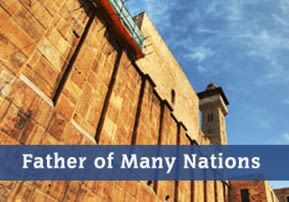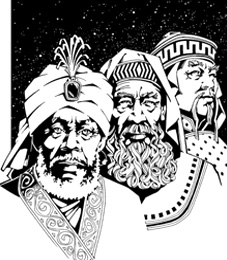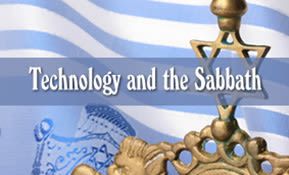
Lech Lecha: Father of Many Nations
God changed Abram's name to Avraham and explained that this new name is an abbreviation of Abraham's new status — he is "av hamon goyim," the father of many nations.

translated and abridged by Rabbi Chanan Morrison
Parshat Lech Lecha
Abbreviations and acronyms are quite common in rabbinic writings. This, however, is not the case with regard to the text of the Torah. Nonetheless, the Sages noted that acronyms — notarikon in Aramaic — may occasionally be found in the Torah. The first and clearest example comes from the name given to Abraham:
"No longer shall you be called ‘Abram.’ Your name shall be ‘Abraham,’ for I have made you the father of many nations." (Gen. 17:5)
God changed Abram’s name to Avraham and explained that this new name is an abbreviation of Abraham’s new status — he is "av hamon goyim," the father of many nations.
The Talmud (Shabbat 105a), however, was not satisfied with this interpretation of the name. While the Torah explains "Avraham" to be a syllabic abbreviation of the words "av hamon," the Sages converted it into a full-blown acronym. They wrote that each of the six Hebrew letters of "av hamon" indicates a different aspect of Abraham’s standing and influence in the world.
Aleph — I have made you a father ("Av") to the nations;
Bet — I have made you chosen ("Bachur") among the nations;
Hei — I have made you beloved ("Haviv") among the nations;
Mem — I have you a king ("Melech") for the nations;
Vav — I have made you exemplary ("Vatik") among the nations;
Nun — I have made you faithful ("Ne’eman") among the nations.
Of all the names in the Torah, why is Abraham’s name an abbreviation? And why did the Sages further expand this abbreviation, letter by letter?
Abraham’s Dual Influence
 It is a mistake to consider a Notarikon as merely a homiletic or mnemonic device. Rather, it reveals deeper levels of meaning in the text. In addition to a literal understanding of the words, there is a wealth of profound ideas contained within the written text. This is similar to the workings of an acronym, where from each letter we extrapolate an entire word or phrase.
It is a mistake to consider a Notarikon as merely a homiletic or mnemonic device. Rather, it reveals deeper levels of meaning in the text. In addition to a literal understanding of the words, there is a wealth of profound ideas contained within the written text. This is similar to the workings of an acronym, where from each letter we extrapolate an entire word or phrase.Of particular interest is the example that the Sages chose for a Notarikon in the Torah — the name ‘Abraham.’ Why is this significant?
Abraham’s mission in life was to found the Jewish people. All three patriarchs, the Sages taught, are called ‘Israel’ (Breishit Rabbah 63:3). This indicates that their primary goal in life was to establish a special people, a nation that would serve as a "kingdom of priests and a holy nation" (Ex. 19:6).
Yet Abraham also had a significant influence on all nations. This influence, the Sages explained, may be delineated into six categories, corresponding to the six letters of "Av Hamon." Thus, like a Notarikon, Abraham’s influence existed on two levels. His explicit life-goal was to found the Jewish people. But Abraham had an additional, more widespread influence, as he propagated his ideas of monotheism and ethical teachings among all peoples.
Six Aspects of Universal Influence
If we examine each letter of the phrase "Av Hamon," the Sages taught, we will uncover a certain aspect of Abraham’s universal influence. He was an Av, a spiritual father to many nations, the source for monotheism and true knowledge of God throughout the world. His teachings were Bachur — select and distinct from the variety of confused beliefs held by the nations. His faith in one God was pure, free of erroneous influences. Furthermore, his Torah enjoyed a charismatic attraction. Recognizing its inner truth, many people were drawn to it — it was beloved and Haviv.
Due to the profound respect given to Abraham, he was regarded as a Melech. Thus we find that the people referred to him as a "prince of God" (Gen. 23:6). Like a king in battle, he led the fight for truth in a world steeped in darkness and ignorance, victorious by virtue of the greatness and truth of his vision.
Furthermore, Abraham’s Torah was not just a theoretical philosophy. He was Vatik among the nations — he was respected for his personal integrity and righteousness. Abraham sought to refine deeds and character traits through the holiness of his beliefs, and promoted a life of morality and justice.
The final attribute of Abraham’s universal influence was Ne’eman — as a man of faith. As the Torah testifies, "He believed in God, and God counted it as righteousness" (Gen. 15:6). The nascent kernel of faith among the nations stems from the spiritual influence of Abraham. This spark of positive faith continues to illuminate the paths of many nations — a spark that will be elevated in the future into a pure and refined faith in God.
* * *
(adapted from Ein Eyah vol. IV p. 264)
Rabbi Chanan Morrison of Mitzpeh Yericho runs http://ravkookTorah.org, a website dedicated to presenting the Torah commentary of Rabbi Avraham Yitzchak HaCohen Kook, first Chief Rabbi of Eretz Yisrael, to the English-speaking community. He is also the author of Gold from the Land of Israel (Urim Publications, 2006).











Tell us what you think!
Thank you for your comment!
It will be published after approval by the Editor.